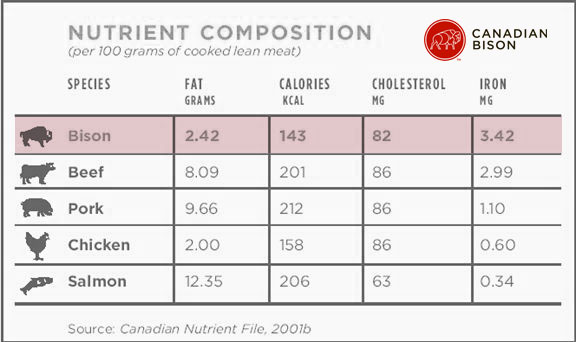Nutritional Value

Bison meat is a nutrient dense food because of the proportion of protein, fat, mineral, and fatty acids to its caloric value. Comparisons to other meat sources have shown that bison meat has a greater concentration of iron, zinc and essential fatty acids.
Bison meat is a rich source of complete protein containing all the essential amino acids in appropriate amounts. Each serving contains about 22 grams of protein which is then used in the body to build and repair tissues, produce enzymes and some hormones, and maintain cell membranes and components of the immune system.
Rich in Vitamin B12, Selenium, Zinc and Phosphorus, bison meat is also an excellent source of Iron, Vitamin B6 and Niacin, all of which are recommended daily.
Bison meat contains the "essential fatty acids", linoleic (omega - 3) and linoleic (omega - 6) fatty acids. These substances are necessary for us to eat but can not be made in our bodies and are thus, commonly lacking. Their function is to assist the formation of cell membranes, aiding in the production of hormone-like compounds, and participating in immune and visual processes. Omega 3 fatty acids have been shown to help fend off Alzheimer's disease and reduce the likelihood of heart attacks.
Bison meat is a great natural source of bio-available iron. The high iron content in bison meat helps boost energy and increase endurance by improving the blood's capability to transport oxygen and carbon dioxide to and from body cells. Bison has what most nutrition conscious people want, lots of iron and less fat. Bison meat was one of the five foods recommended for women in the July 2001 issue of the Reader's Digest article, "Five Foods Men and Women Need Most".
Photo provided by Turtle Valley Bison




